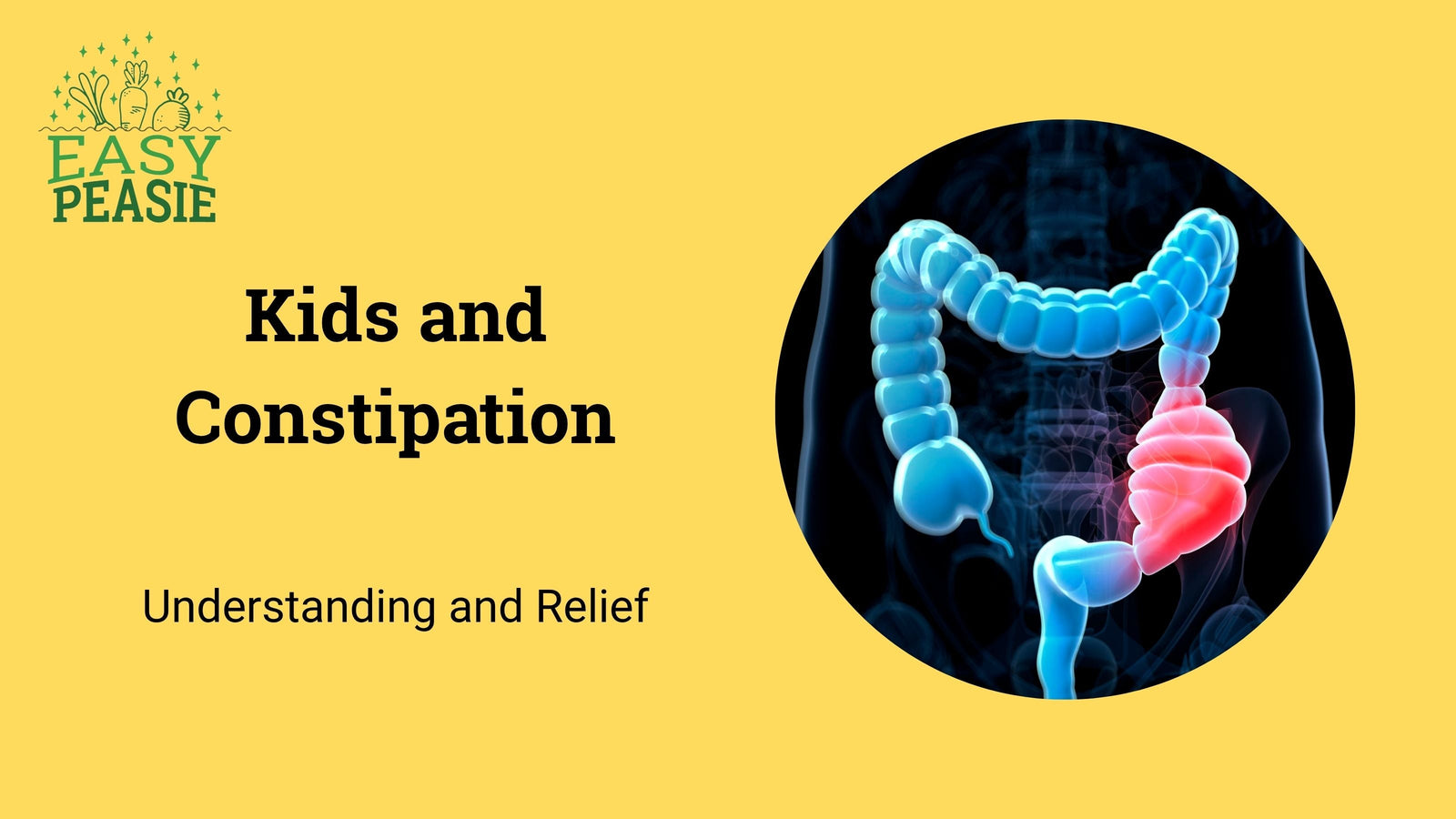Constipation in kids can be a real pain in the tummy—for both the child and the parent. Understanding what causes it and how to provide relief is essential for keeping your little ones happy and healthy. Constipation is a common issue, but it can cause significant discomfort and even lead to more serious health problems if left untreated.
So, what exactly is constipation? In simple terms, it means having fewer bowel movements than usual, or passing hard, dry stools that can be painful to push out.
It's not just about the frequency of pooping; it’s also about the ease and comfort of doing so. For kids, this can be particularly troublesome as they may not always communicate their discomfort clearly.
In this blog, we'll explore what constipation is, its signs, and how you can help your child find relief. We’ll dive into natural remedies, dietary tips, and preventive strategies to keep constipation at bay. Plus, we'll discuss when it might be time to seek medical advice.
By the end, you'll have a toolkit of strategies to ensure your child’s digestive system runs smoothly. Let’s get started on making those tummy troubles a thing of the past!
What is Constipation?
Definition of Constipation in Children
Constipation in children occurs when they have fewer bowel movements than usual, or when their stools are hard, dry, and difficult to pass. It's not just about how often they go but also how comfortable they are during the process.
Common Causes of Constipation in Kids
A diet low in fiber and high in processed foods can lead to constipation. Fiber helps bulk up the stool and keeps it moving through the digestive system.Not drinking enough water is a major contributor to constipation. Hydration helps soften the stool, making it easier to pass.
Lack of Physical Activity: Kids who don’t get enough exercise may experience slower digestion. Physical activity stimulates the intestines to move stool along.
Psychological Factors: Stress, changes in routine, or potty training can all impact a child’s bowel habits. Sometimes, kids might hold in their poop because they’re afraid or anxious about using the bathroom.
Signs of Constipation in Kids
How Do Kids Act When Constipated?
Kids might show a variety of behavioral changes when constipated. They might avoid going to the bathroom or show signs of discomfort, like fidgeting or crying.
Behavioral Changes
A child dealing with constipation might be more irritable or seem unusually tired. They might also avoid eating because they feel full or uncomfortable. You may notice them resisting trips to the bathroom or expressing fear or anxiety about using the toilet.
Additionally, some children may exhibit changes in their play or sleep patterns, reflecting their discomfort. Recognizing these behavioral changes can help parents identify and address constipation early on.
Physical Discomfort
If your child is having fewer than three bowel movements a week, they might be constipated. Stools that are hard and look like small pellets are a clear sign of constipation. Complaints of stomach pain or cramping, especially around the lower abdomen, can indicate constipation.
Physical signs include a distended belly, pain when touching their abdomen, or even crying during bowel movements. If your child is straining or experiencing pain while trying to poop, it’s a strong indicator of constipation. Understanding these signs and causes can help you address constipation early and provide your child with the relief they need.
Identifying the Symptoms of Constipation
If your child is having fewer than three bowel movements a week, they might be constipated. Stools that are hard and look like small pellets are a clear sign of constipation. Complaints of stomach pain or cramping, especially around the lower abdomen, can indicate constipation.
If your child is straining or experiencing pain while trying to poop, it’s a strong indicator of constipation. Understanding these signs and causes can help you address constipation early and provide your child with the relief they need.
How to Help Your Child with Constipation
Immediate Relief Methods
Gentle abdominal massage can help stimulate your child's digestive system. Use gentle, circular motions on their lower abdomen to ease discomfort and promote bowel movements.
Warm baths can also provide relief by relaxing the muscles and reducing stress, making it easier for your child to pass stool. Encouraging physical activity is another effective method. Activities like walking, running, or playing can help stimulate intestinal movement and alleviate constipation.
When to Seek Medical Advice
If your child's constipation persists for more than a few days, or if they experience severe pain, vomiting, or blood in their stool, it's essential to seek medical advice.
A healthcare professional can provide further guidance and may recommend specific treatments or tests to address the issue.
Natural Constipation Relief for Kids
Dietary Changes
Increasing fiber intake is a key step in relieving constipation.
Fiber helps add bulk to the stool and promotes regular bowel movements. Ensure your child is getting enough fiber-rich foods in their diet.
Ensuring Adequate Hydration
Hydration is crucial for preventing and relieving constipation.
Encourage your child to drink plenty of water throughout the day. Proper hydration helps soften the stool, making it easier to pass.
Foods That Help Kids Poop
Certain foods are particularly effective in relieving constipation:
Fruits like apples, pears, and berries are high in fiber and can help promote regular bowel movements. Vegetables such as broccoli, peas, and carrots are excellent choices for adding fiber to your child's diet. Whole grains, including oatmeal and whole wheat bread, are also great sources of fiber. Other options like yogurt with probiotics and flaxseeds can aid in digestion and regularity. Incorporating these foods into your child's diet can help prevent and relieve constipation naturally.
What to Give Kids for Constipation
Over-the-Counter Options
When dealing with constipation, sometimes over-the-counter options can provide relief.
Stool softeners can be helpful in making bowel movements easier and less painful for kids.
Laxatives, however, should only be used under medical advice to ensure safety and effectiveness.
Natural Remedies
For a more natural approach, try prune juice, which is well-known for its constipation-relieving properties. Age-appropriate herbal teas, such as chamomile, can soothe the digestive tract and promote regularity. These remedies are often gentle on the stomach and can be easily incorporated into a child's diet, offering a natural way to alleviate discomfort and improve digestive health.
Long-term Strategies to Prevent Constipation
Establishing a Regular Bathroom Routine
Encouraging your child to use the bathroom at the same time each day can help establish a regular bowel movement routine. This consistency can train their body to recognize when it's time to go.
Encouraging a Balanced Diet
A balanced diet rich in fiber is crucial for preventing constipation. Make sure your child's meals include plenty of fruits, vegetables, and whole grains. These foods support healthy digestion and regular bowel movements.
Promoting Regular Physical Activity
Physical activity is not only important for overall health but also for promoting healthy digestion. Encourage your child to engage in regular exercise, whether it’s playing outside, riding a bike, or participating in sports.
Hydration Tips for Kids
Hydration is key to preventing constipation. Ensure your child drinks plenty of water throughout the day. You can also offer hydrating foods like watermelon and cucumber, which have high water content and can help keep your child hydrated.
Psychological Factors and Constipation
Understanding the Impact of Stress and Anxiety
Stress and anxiety can significantly impact your child's digestive system. Emotional stressors at home or school can lead to constipation. Understanding and addressing these psychological factors is crucial for promoting regular bowel movements.
Creating a Positive Bathroom Environment
Make the bathroom a comfortable and inviting space for your child. Ensure privacy and provide a footstool for easier positioning during bowel movements. A positive environment can reduce anxiety and encourage regular bathroom use.
Encouraging Open Communication About Bowel Habits
Talk openly with your child about their bowel habits. Encourage them to express any concerns or discomfort they may have. Open communication can help you identify issues early and address them promptly, ensuring your child feels supported and understood.
Foods to Avoid
Processed Foods
Processed foods are often low in fiber and high in additives that can lead to constipation. Foods, such as chips, fast food, and sugary snacks, can slow down the digestive system and make bowel movements more difficult. Opt for whole, unprocessed foods like fresh fruits, vegetables, and whole grains to support healthy digestion and regularity. By choosing natural, fiber-rich options, you can help your child's digestive system function more smoothly and reduce the risk of constipation.
Excessive Dairy
Too much dairy can also cause constipation.Dairy products like cheese, milk, and ice cream are low in fiber and can be difficult to digest in large quantities.
While dairy is an important part of a balanced diet, moderation is key. If you suspect dairy might be causing issues, consider offering lactose-free options or alternative dairy products such as almond milk or yogurt with probiotics to support digestion.
Low-Fiber Foods
Foods low in fiber can slow down the digestive process and lead to constipation.
Highly refined foods like white bread, pasta, and pastries lack the fiber needed to promote regular bowel movements. Encourage your child to eat fiber-rich foods like fruits, vegetables, and whole grains to keep their digestive system running smoothly.
Incorporating a variety of fiber sources into their diet not only helps prevent constipation but also supports overall gut health and well-being.
Summary
Addressing constipation in kids is crucial for their overall health and well-being. By understanding the causes and implementing effective relief strategies, you can help your child maintain healthy bowel habits.
Use the tips and strategies provided to support your child’s digestive health. From dietary changes to creating a positive bathroom environment, every step helps in preventing and managing constipation.
Maintaining healthy bowel habits is essential for your child's comfort and health. Regular check-ups with a healthcare provider can also ensure any underlying issues are addressed promptly.
Share your experiences and tips for managing constipation in kids. Leave your comments below; we love to hear from you! And don't forget to follow Easy Peasie for more info and convo on YouTube, Facebook, and Instagram! ~ThePeas





